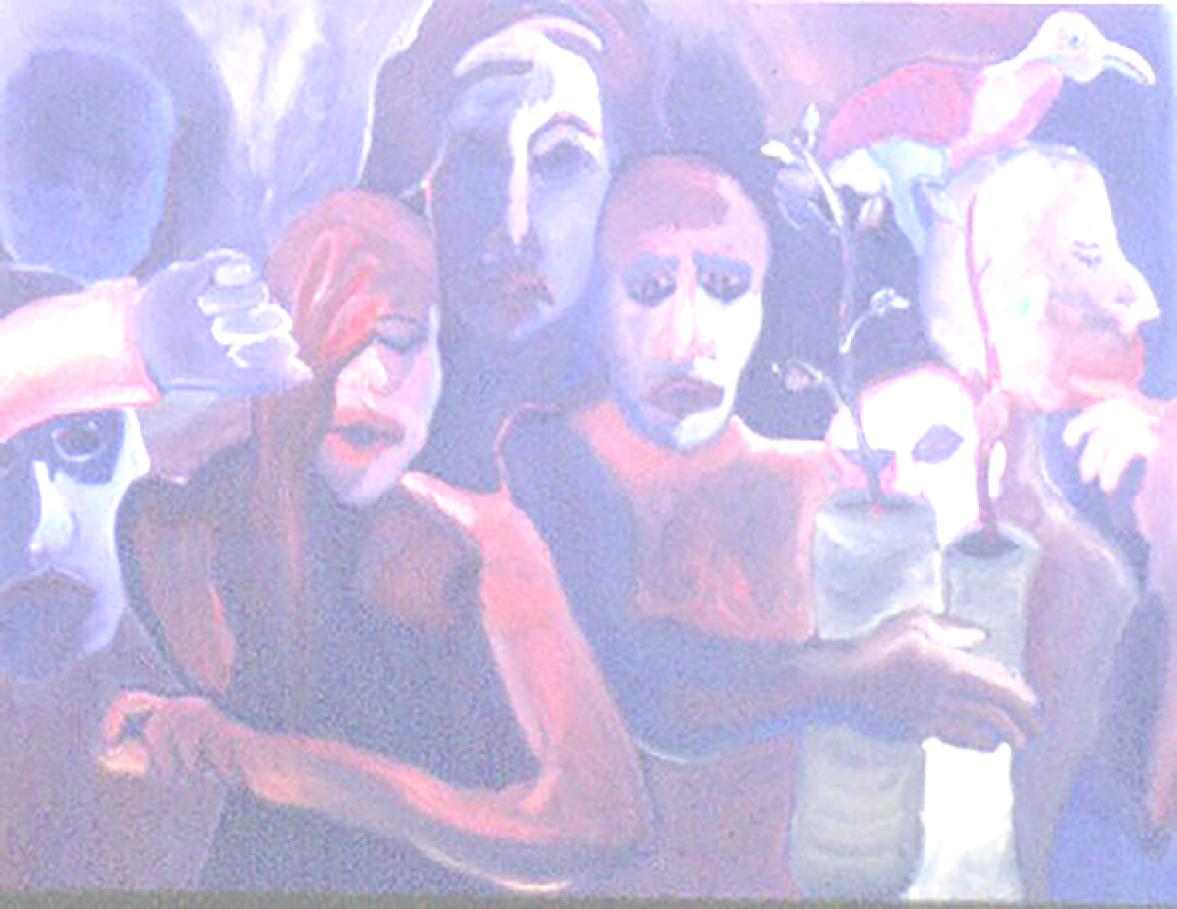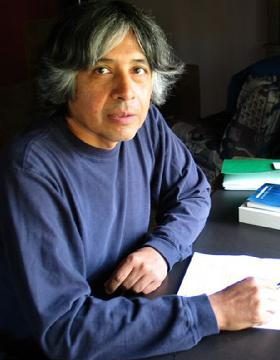I-70 Review
Writing and Art from the Middle and Beyond


Andrés Rodríguez
Andrés Rodríguez is the author of a poetry collection Night Song (Tia Chucha Press) and a nonfiction work Book of the Heart: The Poetics, Letters, and Life of John Keats (Lindisfarne Press). His poems have appeared in Bilingual Review, The Cortland Review, Drunken Boat, Harvard Review, Hubbub, New York Quarterly, Valparaiso Review, Palabra, and other journals. He has also been included in the anthologies Currents from the Dancing River (Harcourt Brace), Dream of a Word (Tia Chucha Press), New Chicano/Chicana Writing (University of Arizona Press), and Wild Song (University of Georgia Press). In 2007 Rodríguez won the Maureen Egan Writers Award in Poetry sponsored by Poets & Writers. He has an MA in Creative Writing from Stanford University and a PhD in Literature from the University of California, Santa Cruz. He lives in Kansas City.
Writing a Poem
Several years ago I went to New York where I saw pizza delivery boys on bikes in Midtown traffic. The scene had a familiarity—I mean apart from the everyday sight of delivery boys. These were Mexican and Central American youth: short in stature, dark-skinned, jet black hair. I watched them as I walked the streets for hours, feeling there was something more than what I witnessed—something happening to me that involved my memories, my history, my whole being. I didn't know then I wanted to preserve those boys in a poem, but months later while in Wyoming I found myself still living with that feeling of recognition and trying to describe them on paper.
With the first words, control was suspended. I was disinterested: “Let's see where this goes.” Yet the witness in me was trying hard to remember, recover, and even relive what had taken place. Word by word, I was inducted into a remembered and recreated field, both literal and nonliteral. In the process of writing the poem, neither excluded the other; each balanced the other, as curiosity is the complement to control. The poem was a scene described, but below or inside the surface reality there was an idea that existed before that day in New York, an idea that was searching for embodiment. It is the idea that we are immigrants to reality—a sort of Sufi idea to which my Mexican immigrant background gives some sort of sense.
I wasn't consciously thinking of this idea as I wrote. I believe it is part of my nervous system, memory hoard, heart lore, poetics, or imagination. When I saw those delivery boys I had the strongest sense that I was seeing the past as well as the present and the future. The experience that elicited this sense led me to write the poem which became a passion and a joy as well as a responsibility. I feel responsible for or to that passion and joy which is life itself, poetry itself. And so for me the act of writing is an emergence, a migration across times or terrains, and a trust in a scene, story, or sense that will deliver me to something familiar and new, here and elsewhere in the world.
The Killing Floor
That morning inside the Swift packinghouse
we went on the killing floor together,
grey smoky light and cold air in winter.
You pointed out meat hooks, crank, and conveyor belt,
sick with stoic manhood that weighed o you
like a blood mark from that frozen room.
Sawdust swept down and powdered your face
as I twitched across an elevated platform.
Stranded below me, you seemed small, childlike,
looking up the narrow tier abutted
by a tilting rail. I watched you, father,
withdrawing from everything outside you.
The roof shivered like a spine, pinching
the hollow above me as you passed from sight,
a slim moonbeam in the dark below.
A cold draft descended. Something else
floated down, moon-white, filial, silent,
and followed you to the tank house
dragging a carcass skewered with knives.
I called to it. Then it too passed,
the cross-marked fire door closing shut behind,
and the hollow of my voice
deep and knotty over the haunted floor.
I was no longer your fine child
but a bone or mineral in another body.
Throughout that dark place I heard
one door after another swing shut,
and you, moving outside, ask something
swallowed by the chaos of the wind,
then climbed down after the ringing silence
to cross over with you into this life.
Portal of a Dream
At dawn I see a shadow
crossing your face
below the blue repose
of skin. It is edgeless
like hummingbird wings
thrumming before they
zip through space.
Awoken by this flight
or my stare, your mouth
flutters open, eyes still
closed, and then words
crack through to tell me
where you've been.
“I was down by the sea.
A woman there had
three babies sleeping
inside her. I saw them
through her skin!
They clung to each
other tenderly, so
tenderly, each face
vivid with the future.
I helped the woman
into a rowboat to sail
on the waves alone.
As I watched from shore,
a storm was gathering
and everything got still
before it went dark.”
You fall silent, gazing
now at what was. Deep
within the quiet we hold
together, entangled
again, I dream my way
into your voice to find
that afternoon when
we danced across
the sun-drenched floor,
bare feet leaving pools
that fled once seen.
It hurt to face such
ordinary brightness,
such casual daytime
splendor, because I see
the end in all things
no matter how I try
to seine beauty's brief
sight. And here I am
again trying to live
into what I see.
Delicate slim toes.
Thick bony heels.
We danced till we saw
our faces peering back
from the wall mirror.
You said our children
would be a mixed circuitry
of blood, nerve, and bone.
Then we saw a face,
bred by the late day's
shifting hues, gaze
back at us from that
portal of glass,
luminous as the sea.
Though safe in the
mooring of arms,
I feel low rolling thunder,
wings in every corner,
shadows to come
while we sleep.
I resist myself,
the absence learned
by love. I want
to wake and see
her who I dreamed,
bright as sunlight,
sharing the room
and dawn. I learn
your face by touching
and look for the woman of life,
that unengendered mother,
wondering if I can
dream her
the long way home.
The Road
Alone at night
I'm pulling the dead
weight of my car
down a country road.
Snow in the fields
makes dim light
as I pull for miles,
my hands and feet
colder than the chain
tying me to my useless ride,
its tires, windows, body
ruined by repeated
blows of city life.
Along comes a solitary man
who snatches the chain
from my hands and
runs off with the car
that lifts like a kite.
I chase after him.
“Keep running,” he says,
looking back over his shoulder,
those encouraging or
belittling words
offered like tantalus.
Then another man appears.
I know him,
or remember him,
as if from a dream.
John places a ball
gently in my hands
that feels so good,
round and warm
as I turn it over and over.
Before my eyes it
changes color, shape
through dark miles of sky.
I look at it again:
a small bird, wings
folded, eyes open,
is cradled in my hands,
silent and wakeful,
about to sing.
Cicadas
Louder now, they weave their song
among the trees, grappled onto branches
where the wind never upends them,
where summer gathers fire day and night.
Like old pipers wheezing the same
crazed note between catches of breath,
they sit unreachable in their height
and drone that underground music
after seven or seventeen years,
raucous lords of the air and earth.
How do they sleep so long in darkness
beneath the surface noise of the earth?
How do they know it's time to rise up
in the hottest month of the year? What
do they see after those murky years
with tiny eyes like beads of pitch or tar?
It must be memory's old bright place,
the first desert, prairie, swamp, or wood,
where their voices came bubbling up
to terrify or tire creation's other forms.
A man on my block who worked nights
once shotgunned the trees outside his house
as if that would stop the buggy music.
But when the smoke cleared it arose at once,
and that man fell back, silent, still again,
drained by those agonizers of throatless song.
When I lie in my room, unable to sleep
or dream or breathe the pressured air,
the sound in my ear is a silence in my heart,
pincered, dusty white, and unkillable.
As a boy I'd see one fall from the sky,
wrapped with a hornet in a death-embrace.
They'd land in a blur on the sidewalk or grass
and a prolonged, horrid cry let loose—
not like any human voice I'd ever heard,
but still a screeching or beseeching
that arced the air with a zinc flash
whose cinders fell on everything.
I'd watch the brief struggle until
death arose with a king in his arms.
The sudden chill felt back then
comes now with a buzzing heard in
chicharras, whose slangy meaning
is electric cattle prods. Somewhere
a torturer enters a cell or brightly lit room
with one of these ravagers of burning steel.
Its blackened head sparks and crackles,
searing the genitals of a woman or man
whose suffering feeds the lords of death,
whose cries last a thousand thousand years.
North
This far north I don't expect to see them
weaving through Manhattan traffic,
night and snow descending. But the sight
of these delivery boys on old bikes,
pizza boxes balanced on a knee, makes me
understand how generations repeat,
how the unchanged changing migrations
from Michoacán, Puebla, Chiapas,
and jungles farther south are always seeking
havens that need but never value them.
It's all here this far north: the young future
grandfathers, and me the old grandson,
watching them squeegee clouds from steaming
manholes as they glide along Park Ave.
Even the ghost of my father is here,
standing dumbstruck on the deck of a transport
bound for war, the Statue of Liberty
a stark miniature goddess looking back
as iron waves close between them.
All here and claiming me. This far north
I hear the Atlantic embroider its shores,
whispers repeating like rusty chains, spokes
shedding flecks of light through the dark,
and voices ten feet away murmuring
in the tone of overheard captives,
in the cipher of people always on the run.
Few ever see them. They come and go like
clouds or windborne wings under the stars.
Fewer still speak to them, only offer a tip
the way a breeze lifts a bird before wings
chop the air again, nervous soul across
the solid wall of money that scrapes the sky.
Met Life. Aetna. Bank of America.
This far north, stuck to the underside
of our existence, these boys lace the streets,
a flurry of deliveries through Midtown,
and even this recalls workers in the fields
bringing food to the tables of America.
The past does not pass, and souls and bodies
hunger for more than earth. I come to
Bryant Park, where the statue of Benito Juárez
punches the dark with a shiny black fist
to throw a light on the street for his brothers
who slip the nets of the city nightly,
changing from wings to clouds and back.
Now in the oncoming headlights,
snowflakes slanting across the sharp air,
crusting heads, eyelashes, and knees,
they follow the running course of the streets,
emerging from the dark underside,
pursued, under the gun, but always on the job.